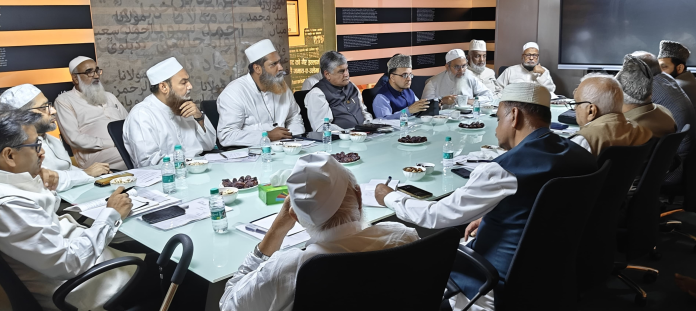– Abdul Bari Masoud
New Delhi: An urgent consultation meeting was convened today at the headquarters of Jamiat Ulama-i-Hind(M) to discuss the contentious Waqf (Amendment) Bill 2024. The meeting brought together prominent leaders from national organizations, political figures, social activists, and legal experts to scrutinize the bill, assess its implications, and strategize on countering the socio-political challenges it poses.
Maulana Mahmood Madani, President of JUH(M), expressed grave concerns over the deliberate spread of misinformation and the rise of anti-community sentiments targeting Waqf properties. He emphasized the necessity of unified efforts across political, social, and legal fronts to safeguard these properties.
Participants unanimously rejected the Waqf Bill, labeling it unlawful, asserting that it directly threatens Waqf properties, which hold significant historical and religious importance to the Muslim community. They strongly opposed any legislation that undermines the status of Waqf or interferes in Muslims’ religious affairs. The conference underscored the importance of collective efforts to dispel misconceptions surrounding Waqf.
To strengthen their resistance against the bill, the participants resolved to form alliances with like-minded political parties, including TDP and JDU. Large-scale public awareness campaigns will be organized in Delhi, Andhra Pradesh, and Bihar, featuring multi-media initiatives comprising textual materials, videos, and social media engagements. The outreach will also extend beyond the Muslim community to include Sikh, Dalit, and other marginalized groups, forming a broader coalition against the bill.
Syed Sadatullah Husaini, President of Jamaat-e-Islami Hind, highlighted the need to counter the misconceptions propagated by Hindutva-influenced media and called for a comparative analysis of endowment laws governing various religious communities in India. He advocated for collaborating with like-minded individuals and groups.
Kamal Faruqui, a member of All India Muslim Personal Law Board, argued for a nationwide campaign to raise public awareness about the issue.
Maulana Arshad Madani, President of JUH(A), emphasized that Waqf is an exclusively religious matter rooted in Islamic law. He described the bill as detrimental to Muslim interests and called for both political and public action to oppose it.
S.Y. Quraishi, former Chief Election Commissioner, stressed the importance of engaging political parties and non-Muslim allies, particularly the Sikh community, in the fight against the bill.
Afzal Amanullah, Retired IAS officer, debunked the government’s misleading claim that the bill grants women the right to join Waqf boards, noting that such provisions already exist. He underscored the need to counter the bill’s intentions and the government’s propaganda.
Former IRS officer Mahmood Akhtar highlighted the significance of the Waqf Tribunal.
Amir-e-Shariat of Bihar, Jharkhand, and Odisha, Maulana Syed Ahmed Wali Faisal Rahmani, shared the ongoing efforts in Bihar and proposed the registration of Waqf properties.
Other notable speakers included Dr. Syed Zafar Mahmood, Chairman of Zakat Foundation of India; Maulana Mohibullah Nadvi, MP; Senior Supreme Court Lawyer M.R. Shamshad; Professor Saud Alam Qasmi from Aligarh; and Engineer Syed Fahd Rahmani. Supreme Court lawyer Maulana Niaz Ahmed Faruqui, Secretary of JUH, also delivered an insightful presentation addressing ten common misconceptions and their clarifications.
Mohammed Saleem Engineer, Vice President JIH; Zafar Mujeeb, NRI Representative; Jawed Ahmed, Chairman of Waqf Welfare Forum; and Owais Sultan also participated in the meeting.




